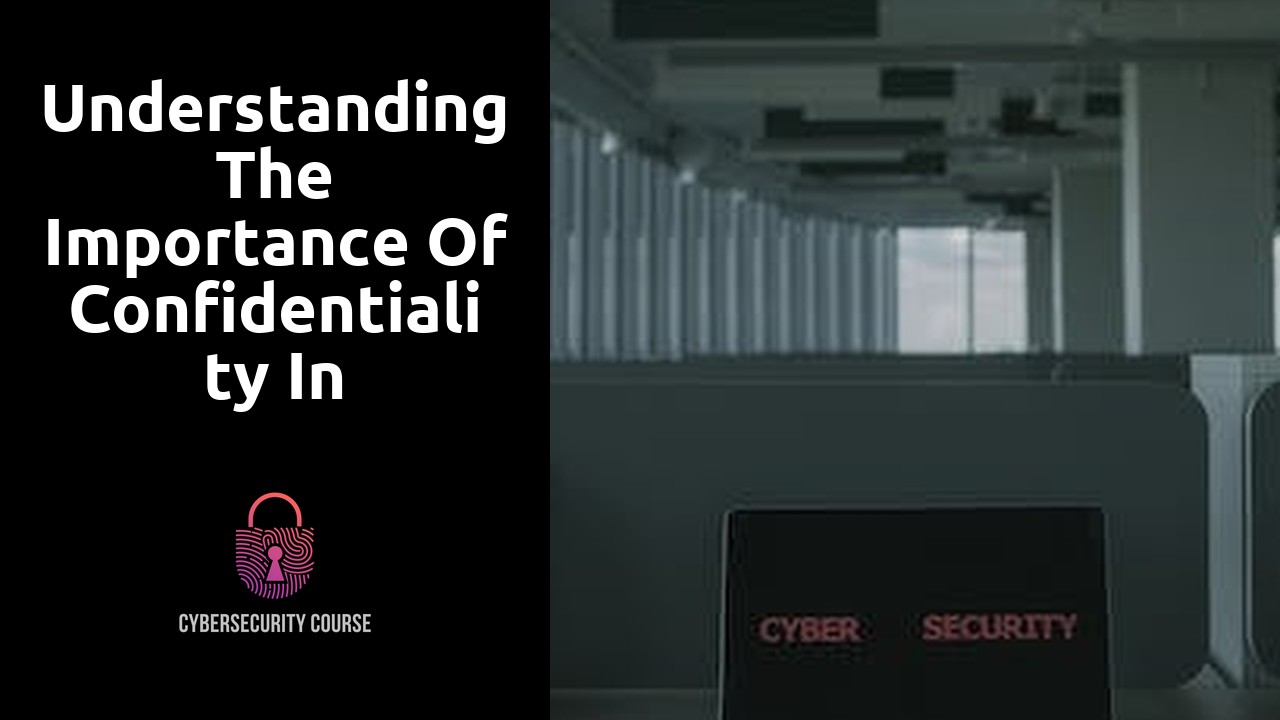
Understanding the Importance of Confidentiality in Cybersecurity
Table Of Contents
Safeguarding Sensitive Information from Cyber Threats
Safeguarding sensitive information from cyber threats has become a paramount concern in today's digital age. With the increasing reliance on technology and the growing sophistication of cyber attacks, it is essential for individuals and organizations to adopt robust security measures to protect their valuable data. The consequences of a data breach can be severe, both financially and reputationally, making it crucial for everyone to prioritize confidentiality in cybersecurity.
Confidentiality plays a vital role in ensuring the security of sensitive information. It involves the protection of data from unauthorized access, disclosure, and alteration. By implementing strong encryption techniques, access controls, and secure communication channels, organizations can create a significant barrier against potential cyber threats. Moreover, raising awareness among employees about the importance of confidentiality and providing comprehensive training on best practices for data protection can further enhance cybersecurity efforts. Ultimately, safeguarding sensitive information requires a multi-layered approach that combines technological solutions with human awareness and diligence. Only by doing so can individuals and organizations effectively mitigate the risks posed by cyber threats and maintain the privacy and integrity of their data.
The Vital Role of Confidentiality in Cybersecurity
Confidentiality plays a vital role in cybersecurity by safeguarding sensitive information from cyber threats. In the digital landscape, the threat of unauthorized access to confidential data is constantly present, making it crucial to implement measures to protect against such breaches. Confidentiality ensures that only authorized individuals have access to sensitive information, preventing it from falling into the wrong hands and potentially causing significant harm to individuals or organizations.
By maintaining the privacy of critical data, confidentiality acts as a strong defense mechanism against cyber attacks. It involves encrypting data, implementing secure access controls, and establishing robust authentication mechanisms. These measures ensure that the information remains confidential and inaccessible to unauthorized entities. Confidentiality also serves as the foundation for other cybersecurity principles, such as integrity and availability, as it establishes a solid framework for protecting information from malicious activities.
Protecting Digital Assets: Exploring Confidentiality Measures
Digital assets are the lifeblood of modern organizations, serving as the foundation for their operations, services, and competitive advantage. As such, protecting these valuable assets from cyber threats has become a top priority. Among the various measures employed in safeguarding digital assets, confidentiality plays a vital role.
Confidentiality is the principle of ensuring that sensitive information is only accessible to authorized individuals or entities. In the context of cybersecurity, it involves implementing measures to prevent unauthorized access, disclosure, or alteration of digital assets. By maintaining confidentiality, organizations can mitigate the risk of data breaches, intellectual property theft, and unauthorized disclosure of sensitive information. This not only safeguards their reputation but also helps them comply with legal and regulatory requirements related to data privacy and protection.
The Power of Privacy in Fostering Cybersecurity
Privacy plays a crucial role in fostering cybersecurity. By protecting personal information and sensitive data, individuals and organizations can significantly reduce their risk of falling victim to cyber threats. When privacy is prioritized, it acts as a shield against unauthorized access, ensuring that information remains confidential and secure.
One of the key ways in which privacy fosters cybersecurity is through the establishment of trust. When individuals have confidence that their personal information is being kept private and secure, they are more likely to engage in digital activities and share data without fear of it being compromised. This trust is essential for the continued growth of the digital landscape, as it encourages users to adopt safe online practices and rely on robust cybersecurity measures. Moreover, privacy regulations and policies can shape the development of technology and promote the implementation of secure systems, ultimately strengthening cybersecurity efforts.
Securing Data: Unveiling the Significance of Confidentiality
Confidentiality plays a vital role in securing data in the cyber landscape. With increasing cyber threats, organizations and individuals need to prioritize the protection of sensitive information. By ensuring confidentiality, data can be safeguarded from unauthorized access, manipulation, or theft.
One of the key reasons why confidentiality is significant in cybersecurity is to maintain trust. When individuals or organizations entrust their sensitive information to a system or network, they expect it to be kept confidential. Whether it is personal data, financial records, or intellectual property, maintaining confidentiality helps in fostering trust between the data owner and the entity responsible for its protection. This trust is crucial in maintaining positive relationships and partnerships, as well as safeguarding the reputation of both individuals and organizations.
Ensuring Confidentiality in the Cyber Landscape
In today's increasingly connected world, ensuring confidentiality in the cyber landscape has become vital for individuals and organizations alike. Confidentiality refers to the protection and privacy of sensitive information, preventing unauthorized access and disclosure. Without adequate measures in place, valuable data can easily fall into the wrong hands, leading to severe consequences such as identity theft, financial fraud, or the compromise of critical business information.
One of the key strategies for ensuring confidentiality is the use of encryption. Encryption is the process of converting data into a secure code, making it indecipherable to unauthorized individuals. By encrypting sensitive information, even if it is intercepted, it remains unreadable and useless to anyone without the proper decryption key. This technology is commonly used in various aspects of cybersecurity, from securing online transactions to protecting sensitive company data. However, encryption alone is not enough; it should be complemented with robust authentication and access control measures to ensure that only authorized individuals can decrypt and access the sensitive information.
Related Links
Implementing Confidentiality Controls to Protect Sensitive DataDetecting and Responding to Session Hijacking Attacks
Case Studies in Data Breach Response and Lessons Learned
Incident Reporting and Communication in Data Breach Response
Best Practices for Data Breach Investigation and Remediation
Cybersecurity Training for Data Breach Response
Legal Considerations in Data Breach Response